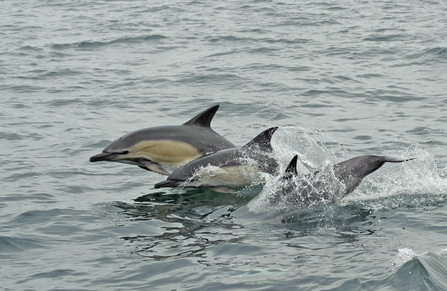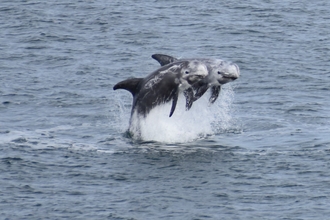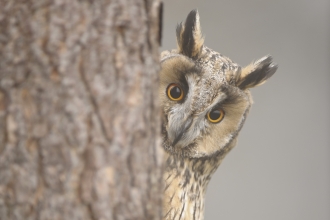|
We are lucky to be able to see porpoises, dolphins and whales (collectively known as Cetaceans), sharks and even leatherback turtles in Welsh waters. Sometimes however, they wash up on Welsh beaches. Finding a stranded animal can be distressing. If it is alive your first instinct may be to try to help it back into the water, you should never try to do this - they have stranded for a reason and require urgent professional medical attention. Please do not try to deal with a stranded animal alone - always call for help. Whether the animal is alive or dead keep your distance, and keep other people, dogs, and gulls away if possible. If alive, remember that these are wild animals so contact with or proximity to humans can add additional stress to an already distressing situation, and you also put yourself at risk of injury if the animal thrashes or tries to move. Direct contact can also transmit disease whether the animal is alive or not. Note your location, the state of the tide, and any obvious injuries you can see and contact the relevant organisation as soon as possible, the guide below will help you know who to contact if you do come across a stranded animal. Handy ID Guide by the Cetacean Strandings Investigation Programme |
Live Seals
Take some time to observe the animal
Are you sure the animal is in distress? Healthy adult seals regularly haul out of the water to rest and seal pups (a seal with a white, long-haired coat in the autumn/winter, or less than 3 feet in length in the summer) are often left alone for short periods of time. The best thing to do is keep watch from a distance.
If the animal is obviously ill, malnourished (visible ribs) or appears to be an abandoned pup, then contact:
British Divers Marine Life Rescue (www.bdmlr.org.uk) on 01825 765546 or 07787 433412 (out of hours); or the RSPCA on 0300 123 4999
...for advice and assistance. Once you have called for help, keep a watch from a safe distance and try to keep other people and dogs away.
Don't get too close - seals can give a nasty bite!
Live porpoises, dolphins, whales, sharks or turtles

Chris Gomersall/2020 VISION
Call for help immediately
British Divers Marine Life Rescue (www.bdmlr.org.uk) on 01825 765546 or 07787 433412 (out of hours); or the RSPCA on 0300 123 4999
...they will advise you on what to do next. Never drag the animal or try to return it to sea, and keep dogs and crowds away as best you can and try to limit the stress to the animal, keeping noise and sudden movements to a minimum. Stay away from the tail - it is very powerful.
Keep yourself safe - know what the tide is doing!
Dead seals, whales, dolphins, porpoises, sharks or turtles

dead Risso's dolphin - Ben Stammers
Report your find
Dead strandings can help us learn about marine animals' diet, health and disease, the effects of pollution and bycatch, distribution, and specific threats that they face. Avoid touching the animal and always make sure to wash your hands if any contact is made; dead marine animals, like any other animal, can carry disease or infection.
Contact the UK Cetacean Strandings Investigation Programme on 0800 652 0333. This will help to provide an accurate picture of marine life in the UK, as well as valuable information on causes of death.





